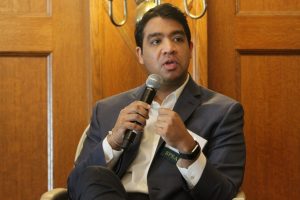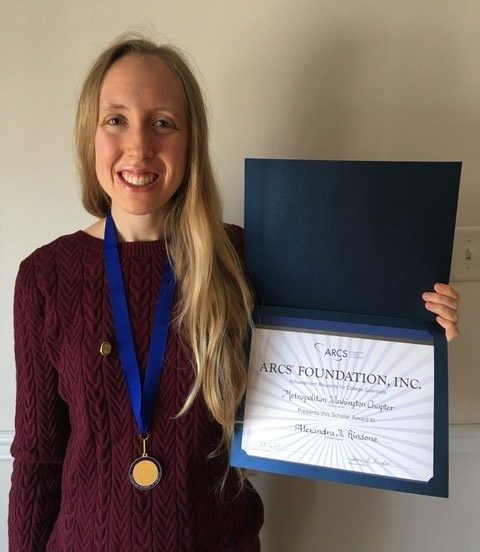“It set the trajectory for my entire career. I don’t think I’d be where I am today without it.”
Kunal Parikh Founder, Global Institute for Vision Equity, and ARCS Scholar alumnus
Johns Hopkins UniversityEst. 1876
America’s First Research University
For Kunal Parikh, Engr ’17 (PhD), being named the Roche/ARCS Scholar as a doctoral candidate in biomedical engineering in 2014 was a life-changing experience.
For three years, Parikh received $15,000 per year administered by the Metropolitan Washington Chapter of the ARCS Foundation, which has supported graduate and undergraduate students in science, technology, engineering, and math (STEM) fields at Johns Hopkins for 50 years. (ARCS stands for Achievement Rewards for College Scientists.)

Just as importantly, however, ARCS surrounded Parikh with a community of people who were rooting for him to succeed through the trials and tribulations of creating new technology. It allowed him to pursue opportunities that would not otherwise have been available. And it enabled him to forge connections and undertake projects that laid the foundations for virtually everything he has done since.
That includes serving on the faculty of the Center for Bioengineering Innovation & Design in the Department of Biomedical Engineering, as well as the Center for Nanomedicine in the Wilmer Eye Institute at the Johns Hopkins University School of Medicine. And it extends to founding startups and social enterprises to solve unmet medical needs around the globe.
“It set the trajectory for my entire career,” Parikh says of his ARCS award. “I don’t think I’d be where I am today without it.”
Founded in 1958 by a group of women philanthropists who sought to elevate America’s scientific leadership during the space race, ARCS now comprises a national organization with 15 local chapters that support promising students in science, engineering, and medical research at leading research institutions. Yet while its 1,200 volunteer members are all women, ARCS funds students regardless of gender.
“We want the best and the brightest at every opportunity,” says Patty Sparrell, vice president for development at the Metro Washington Chapter, who adds that ARCS is working to make its scholar population even more diverse and inclusive.
“It set the trajectory for my entire career. I don’t think I’d be where I am today without it.”
Kunal Parikh Founder, Global Institute for Vision Equity, and ARCS Scholar alumnus
Since 1968, ARCS has provided nearly $1.8 million in funding to more than 145 Hopkins students — and every dollar has been unrestricted, meaning that recipients have the flexibility to spend their awards on expenses (expenditures) that will enhance their research and advance their careers, from tuition and fees to conference travel to lab equipment
The idea, explains Amy Burdette, associate director of foundation relations for Johns Hopkins University and Medicine, is to invest early on in scientists who show great promise but “need something to boost them to that next level.”
Parikh, for example, has long been interested in developing medical devices that can improve surgical outcomes and reduce postoperative complications. Accordingly, he used some of his award to help develop a novel platform for manufacturing sutures that can release drugs such as antibiotics.
But in 2016, Parikh also used his ARCS funding to visit India’s Aravind Eye Care System, which focuses on serving rural and semi-rural communities.
The trip opened his eyes to the vast unmet need for eye care in low- and middle-income countries. And it inspired Parikh, who had previously established and directed the Johns Hopkins University’s Social Innovation Lab, to create the Global Institute for Vision Equity, a social venture dedicated to overcoming barriers to eye care in low-resource settings.
It also led him to launch Eyedea Medical with fellow Hopkins biomedical engineer Katie Solley, Engr ’19 (MS). The startup aims to reduce the global burden of blindness and has already developed a device to help prepare vision-restoring corneal grafts for transplant. Solley has since gone on to be recognized in Baltimore Business Journal’s “Inno Under 25” list for her work in this startup.

Meanwhile, Lexi Rindone, a PhD candidate in biomedical engineering, used the ARCS funding she received last year as the Hesse Endowment Scholar to further her doctoral research in regenerative medicine — work that could lead to better treatments for people with large craniofacial injuries.
Those injuries range from blast wounds suffered by soldiers on the battlefield to deformities that afflict children born with congenital conditions. Current treatments involve transplanting bone from other parts of the body, implanting tissue from cadavers, or inserting artificial materials such as metal and plastic. But none of those can fully restore the lost or damaged bone, and they can cause post-operative complications that necessitate further surgeries.
Rindone would instead like to use stem cells, which can generate many types of bodily tissues, to rebuild lost or damaged bone. But doing that requires first analyzing detailed images of the skulls of model animals such as mice.
ARCS funding allowed Rindone to purchase the software she needed to develop a novel system for generating high-resolution 3D images of the skull. She is now using her invention to understand how stem cells promote bone healing so that she can enhance their regenerative capability. Her findings have since been published in the scientific journal Nature Communications.
ARCS has also given Rindone the opportunity to meet and network with other award recipients, as well as prominent scientists. At one recent chapter event, Rindone and her fellow ARCS scholars got to ask questions of Francis Collins, PhD, director of the NIH, who offered a heartfelt pep-talk about persevering in the face of failure — an experience she’ll not soon forget.
“The foundation is really amazing,” Rindone says. “Having the recognition of the ARCS scholarship provides an instant connection when meeting other alumni, enabling us to explore new opportunities throughout our professional careers.”
Topics: Alumni, Foundations, Whiting School of Engineering, Fuel Discovery, Strengthening Partnerships, Support Scholars